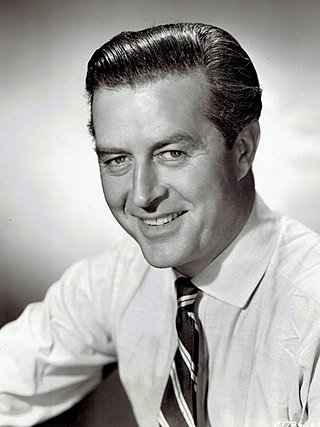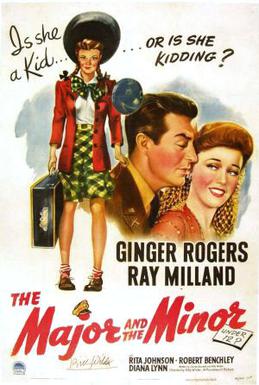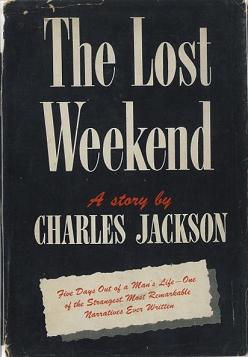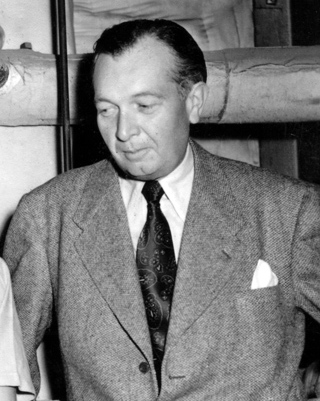
Billy Wilder was an American filmmaker and screenwriter. He was born in Sucha Beskidzka, Poland, a town in Austria-Hungary at the time of his birth. His career in Hollywood spanned five decades, and he is regarded as one of the most brilliant and versatile filmmakers of Classic Hollywood cinema. He received seven Academy Awards, a BAFTA Award, the Cannes Film Festival's Palme d'Or and two Golden Globe Awards.

Ray Milland was a Welsh-American actor and film director. He is often remembered for his portrayal of an alcoholic writer in Billy Wilder's The Lost Weekend (1945), which won him Best Actor at Cannes, a Golden Globe Award, and ultimately an Academy Award—the first such accolades for any Welsh actor.

Ninotchka is a 1939 American romantic comedy film made for Metro-Goldwyn-Mayer by producer and director Ernst Lubitsch and starring Greta Garbo and Melvyn Douglas. It was written by Billy Wilder, Charles Brackett, and Walter Reisch, based on a story by Melchior Lengyel. Ninotchka marked the first comedy role for Garbo, and her penultimate film; she received her third and final Academy Award nomination for Best Actress. In 1990, Ninotchka was selected for preservation in the United States National Film Registry by the Library of Congress as being "culturally, historically, or aesthetically significant". In 2011, Time also included the film on the magazine's list of "All-Time 100 Movies".

Sunset Boulevard is a 1950 American black comedy film noir directed by Billy Wilder and co-written by Wilder and Charles Brackett. It is named after a major street that runs through Hollywood.

Philip Ives Dunne was an American screenwriter, film director and producer, who worked prolifically from 1932 until 1965. He spent the majority of his career at 20th Century Fox. He crafted well regarded romantic and historical dramas, usually adapted from another medium. Dunne was a leading Screen Writers Guild organizer and was politically active during the "Hollywood Blacklist" episode of the 1940s–1950s. He is best known for the films How Green Was My Valley (1941), The Ghost and Mrs. Muir (1947), The Robe (1953) and The Agony and the Ecstasy (1965).
Donald McGill Marshman Jr. credited as D. M. Marshman, was an American screenwriter known mainly for his contribution to the film script for Sunset Boulevard.

John Francis Seitz, A.S.C. was an American cinematographer and inventor.

Charles Reginald Jackson was an American writer. He wrote the 1944 novel The Lost Weekend.

Billy Wilder (1906–2002) was an Austrian filmmaker. Wilder initially pursued a career in journalism after being inspired by an American newsreel. He worked for the Austrian magazine Die Bühne and the newspaper Die Stunde in Vienna, and later for the German newspapers Berliner Nachtausgabe, and Berliner Börsen-Courier in Berlin. His first screenplay was for the German silent thriller The Daredevil Reporter (1929). Wilder fled to Paris in 1933 after the rise of the Nazi Party, where he co-directed and co-wrote the screenplay of French drama Mauvaise Graine (1934). In the same year, Wilder left France on board the RMS Aquitania to work in Hollywood despite having little knowledge of English.

The Major and the Minor is a 1942 American romantic comedy film starring Ginger Rogers and Ray Milland. It was the first American film directed by Billy Wilder. The screenplay credited to Wilder and Charles Brackett is "suggested by" the 1923 play Connie Goes Home by Edward Childs Carpenter, based on the 1921 Saturday Evening Post story "Sunny Goes Home" by Fannie Kilbourne.

The Lost Weekend is Charles R. Jackson's first novel, published by Farrar & Rinehart in 1944. The story of a talented but alcoholic writer was praised for its powerful realism, closely reflecting the author’s own experience of alcoholism, from which he was temporarily cured. It served as the basis for the classic 1945 Oscar winning film adaptation.
Arthur P. Schmidt was an American film editor and producer. He had more than sixty film credits for editing from 1934 through 1962. In the 1950s, Schmidt edited five films directed by Billy Wilder. In the 1960s, Schmidt was the associate producer for seven Jerry Lewis comedies.
Frank Partos was a Hungarian-American screenwriter and an early executive committee member of the Screen Actors Guild, which he helped found.
David Lewis was a prominent American Hollywood film producer in the 1940s and 1950s, who produced such films as Dark Victory (1939), Arch of Triumph (1948), and Raintree County (1957). He worked for Warner Brothers, Paramount and M-G-M and was elected a vice president of Enterprise Productions, Inc. in 1946.
The 8th Golden Globe Awards, honoring the best in film for 1950 films, were held on February 28, 1951, in the Ciro's nightclub in West Hollywood, California, at 8433 Sunset Boulevard, on the Sunset Strip.

Doane Harrison was an American film editor whose career spanned four decades. For nearly twenty years, from 1935–54, he was a prolific editor of films for Paramount Pictures, including eleven films with director Mitchell Leisen. For twenty-five years, from 1941–1966, Harrison was editor, editorial supervisor or associate producer on all the films directed by Billy Wilder, who is now considered one of the great 20th-century filmmakers.
Samuel Donald Hartman was an American screenwriter and director and former production head of Paramount Pictures. He and Stephen Morehouse Avery were nominated for the Academy Award for Best Story for The Gay Deception (1935). He was also nominated with Frank Butler for the Academy Award for Best Original Screenplay for Road to Morocco in 1942.
David Hempstead was an American film producer known for None but the Lonely Heart (1944), The Sky's the Limit (1943), directed by Edward H. Griffith, and Joan of Paris (1942), directed by Robert Stevenson. He co-wrote the script of Hell and High Water (1954) alongside Jesse Lasky.
Al Martin was an American screenwriter and TV writer known for his work on B-movies across a wide range of genres.











